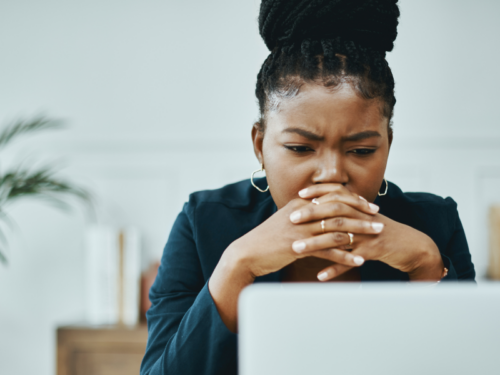
Table of Contents
Can Anxiety Cause Dizziness?
Written By: Charlie Health Editorial Team

Clinically Reviewed By: Dr. Don Gasparini
July 6, 2023
6 min.
Anxiety-induced dizziness is usually caused by the physiological changes that happen when someone is dealing with worries or fear. Learn how to handle this lesser-known, but uncomfortable, anxiety symptom here.
Learn more about our Clinical Review Process
Table of Contents
The link between anxiety and dizziness
Anxiety and dizziness are more interconnected than one might initially think. Anxiety is a psychological condition characterized by persistent, excessive, and often irrational worry about everyday situations, whereas dizziness describes a range of physical sensations like feeling faint, woozy, weak, or unsteady. Although the two conditions are seemingly unrelated, anxiety can often cause dizziness.
Anxiety-induced dizziness can happen at virtually any time, more common during periods of high stress. Intense anxiety can manifest as dizziness because of the body’s “fight or flight” anxiety response, which leads to several physiological changes. including rapid heart rate, shortness of breath, and increased blood flow to the muscles and brain. These physical responses are designed to prepare the body for a perceived threat, but they can also lead to feelings of dizziness or lightheadedness. Anxiety-induced dizziness is also common during an anxiety attack, when the brain is momentarily deprived of oxygen leading to feelings of dizziness. Instances of anxiety that cause hyperventilation can also cause dizziness.
What causes anxiety dizziness symptoms?
Anxiety-induced dizziness is typically caused by the physiological changes that occur in the body in response to stress or fear. As mentioned, when a person experiences anxiety, their body enters a state of heightened arousal known as the “fight or flight” response. This response triggers various physical reactions such as an increased heart rate, rapid breathing, and elevated blood pressure—all of which can lead to dizziness. Here’s how anxiety can lead to dizziness:
Adrenaline rush
During times of anxiety, the body releases a surge of adrenaline, a hormone that prepares your body to respond to a perceived threat. This sudden rush can cause the heart to pump harder and faster, momentarily depriving the brain of sufficient oxygen, which can result in feelings of dizziness or lightheadedness.
Hyperventilation
Anxiety can often lead to hyperventilation, where a person breathes too quickly or deeply. This rapid breathing can disrupt the balance of oxygen and carbon dioxide in the body, leading to dizziness and feelings of lightheadedness.
Muscle tension
Anxiety can also cause muscle tension. When this tension occurs in the neck and shoulders, it can potentially affect the muscles and blood flow to the head, resulting in dizziness.
Dehydration and lack of eating
Anxiety can sometimes lead to a lack of proper nutrition and hydration, either through a loss of appetite or forgetting to eat and drink. Both dehydration and low blood sugar can contribute to feelings of dizziness.
In sum, anxiety-induced dizziness is a physiological response to stress or fear. However, if dizziness is frequent or severe, it’s essential to consult with a healthcare provider to rule out other possible medical conditions.

Don’t wait to get the help you need.
Personalized anxiety treatment from home.
Can anxiety attacks cause dizziness?
Anxiety attacks, prolonged feelings of anxiety in response to fear, can indeed cause dizziness. An anxiety attack is a sudden episode of intense fear that triggers severe physical reactions when there is no real danger or apparent cause. These episodes can be incredibly frightening and may make you feel like you’re losing control, having a heart attack, or even dying.
During an anxiety attack, the body goes into overdrive as it prepares to face a perceived threat. This involves a surge of adrenaline and other stress hormones, increased heart rate, rapid breathing, and increased blood pressure. These physiological responses can lead to a range of symptoms, including dizziness.
Dizziness during a panic attack can manifest in several ways. Some people may feel lightheaded or faint, while others may experience a sensation of the room spinning around them (vertigo). Still, others may feel off-balance or unsteady on their feet.
While dizziness can be a distressing symptom of anxiety attacks, it is usually harmless. If you’re experiencing frequent or severe dizziness, it’s always a good idea to consult with a healthcare provider to rule out any underlying medical conditions.
Although anxiety can cause dizziness at any time, it is especially common during moments of heightened stress, like in the midst of an anxiety attack. Understanding this connection is key to managing these symptoms effectively and improving overall well-being.
How long does anxiety dizziness last?
The duration of anxiety-induced dizziness can vary greatly from person to person, and even from episode to episode in the same individual. It largely depends on the severity of the anxiety, the individual’s physical health, their coping mechanisms, and whether or not they’re receiving treatment.
For some people, dizziness may last only a few seconds to minutes during an acute panic attack or intense moment of anxiety. For others, particularly those with chronic anxiety disorders, the dizziness may come and go throughout the day, potentially lasting for hours.
In some cases, individuals may experience persistent dizziness for days, weeks, or even months at a time. This is often seen in individuals with persistent postural-perceptual dizziness (PPPD), a condition that’s commonly associated with anxiety disorders.
Although anxiety and dizziness are linked for many people, prolonged periods of dizziness should be evaluated by a healthcare provider to rule out other potential causes. If you’re finding that your anxiety and associated dizziness are interfering with your daily life, it’s advisable to seek professional help.

How to treat dizziness associated with anxiety
Treating dizziness associated with anxiety often involves a combination of lifestyle changes, therapy, and medication. Here are some strategies:
Cognitive behavioral therapy (CBT)
This form of therapy helps individuals understand and change thought patterns that lead to harmful behaviors or feelings of anxiety. CBT can help you manage your symptoms of dizziness by teaching you ways to control anxiety and cope with dizziness spells.
Breathing techniques
Hyperventilation, a common symptom of anxiety, can lead to dizziness. Learning controlled breathing exercises can help manage these symptoms. The 4-7-8 technique, for example, involves inhaling for 4 seconds, holding the breath for 7 seconds, and exhaling for 8 seconds.
Hydration and nutrition
Dehydration or low blood sugar can exacerbate feelings of dizziness. Ensuring you’re properly hydrated and eating regular, balanced meals can help reduce anxiety-induced dizziness.
Physical therapy
Some people with anxiety-induced dizziness may benefit from vestibular rehabilitation, a type of physical therapy that improves balance and reduces problems related to dizziness.
Medication
In some cases, medication may be recommended for anxiety-induced dizziness. Selective serotonin reuptake inhibitors (SSRIs) and benzodiazepines can help manage anxiety symptoms, possibly including dizziness. Medication should always be used under the supervision of a healthcare provider.
Lifestyle changes
Regular exercise, adequate sleep, and reduced caffeine and alcohol intake can also help manage anxiety symptoms.
Remember, if you’re experiencing frequent or severe dizziness, it’s important to consult with a healthcare provider to rule out other medical conditions. It’s also crucial to seek professional help if anxiety and dizziness are interfering with your daily life.
Should I see a doctor for my dizziness?
If you experience frequent or prolonged episodes of dizziness, it is important to see a healthcare provider to rule out other medical conditions and assess the severity of your anxiety. They can help develop a treatment plan, which may involve medication, therapy, relaxation techniques, or lifestyle changes, to improve your well-being and quality of life. Seeking help sooner rather than later is advisable, as healthcare providers can provide valuable tools and strategies even if the dizziness is solely related to anxiety.
Treating anxiety with Charlie Health
Your life does not need to be ruled by anxious thoughts and feelings. Whether you’re experiencing occasional anxiety or living with intense anxiety symptoms, it’s imperative to seek professional help, since anxiety disorders do not usually go away on their own.
The trained professionals at Charlie Health are here to help you address your mental health challenges. For people with anxiety disorders, learning how to challenge thought processes and modify behavior in a healthy way can make the experience of anxiety less overwhelming and help manage anxiety symptoms, including anxiety-induced dizziness.
Charlie Health’s virtual intensive outpatient program (IOP) offers a combination of individual therapy, supported groups, and family therapy to comprehensively and effectively treat people struggling with anxiety and other mental health conditions. Click here to start your journey today.




